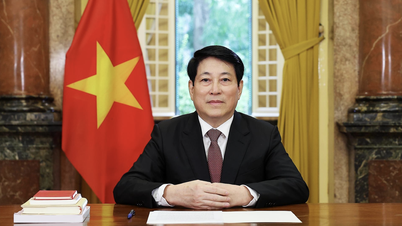He wants to scrap A-Levels, replacing them with a new exam with compulsory maths and English, but the plan has been deemed unrealistic.
"We will introduce a more rigorous and knowledge-rich Advanced British Standard ( ABS ) by combining A-levels and T-levels into a new certificate for school leavers," British Chancellor Rishi Sunak said at the Conservative Party Conference in late September.
A-level is a general education certificate, with academic subjects, provided by Cambridge International Assessment, UK. This certificate is widely recognized, and is the basis for admission to many universities around the world. Meanwhile, the T-level program focuses on vocational subjects.

British students receive their A-Level results on August 17. Photo: EPA
Under ABS, the structure of the general education curriculum will change. Students will choose a minimum of five subjects, including both academic and vocational subjects, instead of just three A-levels or a single T-level as at present. As a result, the number of study hours will be 195 hours more than before (an increase of 15%). Each day, students will have to study an extra hour in class and will be required to study "Maths and English in some form" until they are 18.
Mr Sunak said the 195 hours of extra teaching would allow subjects to be studied in depth. But the British Education Union said the extra hours, combined with extra maths and English lessons, would overwhelm teachers.
Daniel Kebede, general secretary of the organisation, said Prime Minister Sunak's plan was "out of touch with reality" as schools were short 4,300 maths teachers and 2,600 English teachers.
"Simply increasing teaching hours would require 5,300 more teachers," he said. Meanwhile, this year the UK has only recruited more than 50% of the expected number of teachers.
Similarly, without adequate human resources, Mr Sunak's plan "could become a pipe dream", according to Geoff Barton, general secretary of the Association of University Leaders in the UK.
The Prime Minister’s proposal also includes an increase in the tax-free bonus to £30,000 (VND890 million) for the first five years for school teachers and university lecturers in some key subjects. However, Mr. Daniel noted that recruiting and retaining teachers is a problem that cannot be solved by grants and appeals alone.
Many experts have welcomed the new “baccalaureate” standard, saying it will give students the opportunity to study more subjects and develop skills “that they need and that employers want.” However, others are skeptical about the feasibility of merging different courses into one.
According to a summary document released by the Ministry of Education, the new learning method “will take a decade to come into practice.” If the proposal is approved, this school year’s first graders will be the first generation to be affected by the reform, in 2033-2034.
There are few details about the new curriculum yet. The Department for Education is expected to issue guidance this autumn and detailed guidance early next year.
Phuong Anh (According to The Guardian, Financial Times )
Source link




































































































Comment (0)